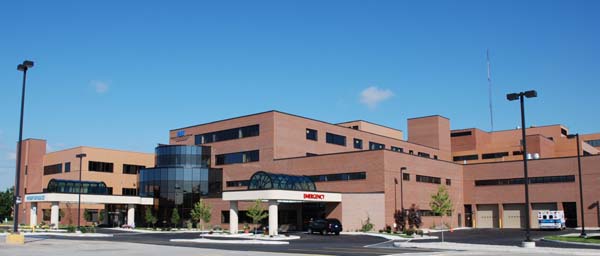McLaren Hospitals Pay Settlement in Controlled Substances Violation Allegations

GRAND RAPIDS AND DETROIT – The United States Attorneys’ Offices for the Western and Eastern Districts of Michigan announced today that McLaren Health Care Corporation (MHCC) has agreed to pay the United States $7.75 million to resolve allegations that MHCC violated certain provisions of the Controlled Substances Act (the CSA), 21 U.S.C. §§ 801-904. The civil settlement resulted from a years-long investigation by the U.S. Drug Enforcement Administration (DEA) into MHCC’s handling of controlled substances. It is the nation’s largest settlement of its kind involving allegations of drug diversion at a health care system.
DEA began its investigation after learning that an unregistered substance abuse treatment facility was improperly receiving controlled substances from an MHCC subsidiary pharmacy in the Western District of Michigan by calling in prescriptions for “office stock.” DEA expanded its investigation and concluded that certain of MHCC’s controlled substances practices, at numerous facilities across the State of Michigan, violated the CSA and its implementing regulations.
The government alleged, among other things, that McLaren Port Huron Pharmacy and McLaren Yale Pharmacy in the Eastern District of Michigan dispensed Schedule II drugs without written prescriptions and despite “red flags” that those drugs were being diverted by MHCC’s pharmacist-in-charge. These “red flags” included: pattern prescriptions for the same type of drugs, in the same quantities, from the same prescriber; prescriptions for excessive quantities of highly-addictive Schedule II drugs; repeated early prescription refills; significant outlier drug volumes for individual patients and prescribers; prescription entries in the names of fake patients; and discrepancies between the cash reported and cash collected for controlled substance prescriptions. The government alleged that other MHCC pharmacies also dispensed controlled substances despite obvious “red flags” that the underlying prescriptions may have been issued without a legitimate medical purpose or were otherwise unauthorized.
The government further alleged that several MHCC facilities violated the CSA’s record keeping provisions, including by failing to notify DEA of known employee thefts of controlled substances. These violations, the government claimed, stemmed in part from certain facility policies that were inconsistent with the CSA’s requirements and MHCC’s failure to revise other legacy policies that remained in place after MHCC acquired corporate health care providers.
As part of the settlement, MHCC admitted that:
- The McLaren Port Huron and Yale Pharmacies did not have written prescriptions for approximately 1,255 Schedule II prescription events between May 1, 2014 and February 22, 2018;
- MHCC’s Prescription Services pharmacy distributed controlled substances to an unregistered treatment facility in Boyne Falls, Michigan between November 22, 2015 and November 13, 2017 without making a good faith inquiry into whether that treatment facility was registered with DEA;
- McLaren Greater Lansing did not notify DEA of certain thefts of controlled substances between July 27, 2007 and May 31, 2019;
- Theft and diversion of controlled substances occurred at certain of MHCC’s locations; and
- Some of MHCC’s corporate policies—including legacy policies that remained in place after MHCC’s integration with Port Huron Hospital—were not consistent with the requirements of the CSA and its regulations.
Andrew Birge, United States Attorney for the Western District of Michigan, said, “While our health systems provide critical services to patients, they carry broader public responsibilities as bulwarks against the drug diversion that contributes to the surging opioid crisis in the State of Michigan. Hospitals and health systems handle significant quantities of controlled substances and must fulfill their legal obligations for handling those drugs under the Controlled Substances Act. This settlement demonstrates our offices’ shared commitment to working cooperatively, together and with our agency partners, to hold even the largest providers accountable when they fall short of what the law demands.”
“At nearly $7.8 million, this is the largest civil Controlled Substances Act settlement in American history involving a health care system whose internal practices were so deficient that it allowed the diversion of drugs, including opioids,” stated United States Attorney Matthew Schneider. “McLaren clearly didn’t have a sufficient system in place to catch these problems. But now, under this settlement, McLaren is stepping up and implementing more robust compliance measures. That’s exactly what we expect of corporations in Michigan who do wrong: they recognize their mistakes and learn from them, which benefits their employees and the public.”
“Everyone from the manufacturer of a controlled substance to the prescribing healthcare provider has a legal obligation to ensure pharmaceuticals don’t get into the wrong hands,” said Drug Enforcement Administration Special Agent in Charge Keith Martin. “When they violate these obligations, we will investigate and hold them accountable.”
As part of the settlement, MHCC entered into a three-year Memorandum of Agreement with DEA that, among other things, prescribes the system’s drug-handling responsibilities, mandates external controlled substance audits, and requires MHCC to institute a broad-based educational program focused on preventing drug diversion in the workplace. In reaching this settlement, the government recognized the substantial steps MHCC took in response to DEA’s investigation to address problems in its handling of controlled substances. DEA investigated this matter. The United States was represented by Assistant U.S. Attorneys Adam Townshend and Caroline Burgunder.
The claims resolved by the settlement are allegations only, and there has been no determination of liability.



